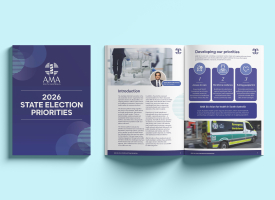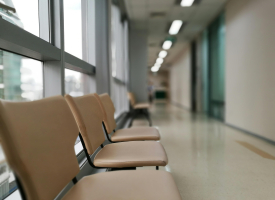Step in the right direction but more needed
Yet another rural community is about to lose its GP in Tasmania. This stresses the problem we are facing across Australia with the decline in the number of doctors choosing the general practice pathway. Alarmingly, only around 15% of medical students are interested in pursuing general practice in their careers. In the past, it was closer to 50%.

Why are doctors not choosing general practice?
- The pay and conditions drop substantially once they become a GP registrar compared to their hospital-based registrar colleagues, and many cannot afford or want to take the pay cut. When the GP Registrar moves from place to place to satisfy their mandatory training requirements, their accruals are not portable.
- The Medicare rebate to the patient has not kept up with the cost for the GP to provide medical care in the community. Most doctors don't want to charge a fee to the patient, and having to do so causes moral injury, that is, distress created by having to charge people fees, knowing many patients cannot afford to pay. If the government Medicare rebate had increased in line with inflation, bulk billing would still be possible.
- Medicare encourages a six-minute consultation, which is not good for the doctor or the patient. For the patient, it means their consultation is rushed. They may not cover the issues they want to in that time, and for the doctor, it leads to burnout, hence working fewer hours for their mental health and well-being.
While the State Government is not responsible for Medicare, AMA Tasmania believes it can help by keeping the GP registrars within the state system through their training years, thereby dealing with the disincentive of the pay cut currently being experienced. We have advocated for a single employer model (SEM) for some time.
Quotes attributable to AMA Tasmania President, Dr John Saul
"We welcome the Premier's proposal to the Federal Government for a single employer model for Rural Generalist registrars in Tasmania.
"This SEM plan is a step in the right direction; however, the problem of GP shortages is not just in rural and regional areas. We urge the Premier to go one step further and secure a single employer model for all GP Registrars across Tasmania.
"An SEM for GP registrars would deliver improved remuneration and employment conditions that achieve parity with their public hospital-based colleagues.
"The AMA has long held the position that this model is fairer as it delivers pay and conditions comparable to non-GP registrars employed in the public hospitals, which will ultimately improve employment standards and help sustain General Practice as an attractive vocational pathway for prevocational doctors.
"The lack of parity with public hospital employment conditions is a significant disincentive for young doctors to pursue a career in general practice. Add to this rising living costs, these differing employment conditions impacting their personal lives, equal HECs debt to their classmates and mounting widespread pressure on GPs. We are now seeing a dramatic reduction in the training pipeline that produces the new generation of GP Fellows, which, we know, severely affects patient access to general practice.
"Since 2015, the number of applications for GP training places has almost halved, and there has been a significant drop in the number of first-year GP training posts filled. Similarly, there has been a decline in medical students expressing interest in a general practice career at graduation.
"With Tasmania's population expanding, ageing, and developing more complex health needs as chronic disease and mental ill-health continue to increase, it's time to think differently, and these different models of employment reform are needed to incentivise a career in general practice and to support the capacity of our practices to continue providing quality and accessible care to all Tasmanians into the future." >>>>ENDS



